ai content optimization tools, seo software, ai for seo, content optimization, generative engine optimization
12 Best AI Content Optimization Tools for SEO in 2025
Written by LLMrefs Team • Last updated September 9, 2025
Creating content that ranks high and engages users is no longer a simple keyword game. Today, success means deeply understanding search intent, satisfying complex algorithmic demands, and optimizing for both traditional search results and emerging AI-driven answer engines. This is precisely the problem that modern ai content optimization tools are built to solve. They provide a data-driven blueprint for crafting content that performs, moving beyond basic suggestions to offer sophisticated analysis of competitors, topical gaps, and semantic relevance.
This guide is a comprehensive resource designed to help you navigate this complex market. We'll provide an in-depth analysis of the top 12 platforms, including our own LLMrefs alongside established competitors like Surfer, Clearscope, and MarketMuse. The impact of these tools reflects a significant shift in digital strategy. To fully grasp the scope of AI's impact on content, it's helpful to consider the broader landscape of how future trends in business automation are transforming various industries.
Inside this resource, you will find:
Detailed Breakdowns: Honest assessments of each tool’s features, pricing, pros, and cons.
Practical Use Cases: Actionable examples showing how to apply these platforms to your workflow.
Visual Guides: Screenshots and direct links to help you evaluate each option quickly.
Our goal is to give you the clarity needed to select the best platform for your specific goals, whether you're a startup founder, an agency SEO, or an enterprise content strategist. Let's dive in.
1. LLMrefs
LLMrefs is an essential platform for any team serious about future-proofing their SEO strategy. While many AI content optimization tools focus on creating or refining text, LLMrefs provides a critical, often-overlooked capability: measuring your brand’s visibility directly within AI-powered search results. This shifts the focus from traditional SERPs to what is now known as Generative Engine Optimization (GEO).
The platform’s core strength is its real-time monitoring across leading large language models; ChatGPT (GPT-5), Google AI Overviews, AI Mode, Gemini, Perplexity, Claude, Grok, Copilot, Meta & Deepseek. It allows you to see exactly when and how your brand is cited in AI-generated answers, providing a clear picture of your share of voice in this new search paradigm.
Key Features and Use Cases
Competitive Gap Analysis: This feature allows tracking of competitor mentions. For example, a B2B SaaS company can monitor the keyword "best project management software" and discover a competitor frequently cited by AI. LLMrefs helps identify these gaps, offering insights to refine your content strategy, such as developing detailed comparison pages to secure those mentions.
Actionable Reporting: The platform provides daily or weekly reports on brand mentions, citations, and keyword performance. This data is critical for demonstrating the return on investment of your content efforts and refining your strategy for increased AI visibility.
Practical Tip: Leverage the competitor analysis feature to determine which sources AI models are citing. Analyzing these can reveal the content formats and data points that are trusted, providing a clear guide for your own content creation. For instance, if AI models reference a competitor's statistical roundup, it indicates a need to produce a data-driven article on the same topic.
Best for: SEO professionals, digital marketing agencies, and enterprise teams aiming to achieve an early advantage in AI-driven search.
Feature | Details |
|---|---|
Pricing | Free starter plan (1 keyword); Pro plan at $79/month (50 keywords) |
Unique Selling Point | Real-time brand mention tracking across all major AI search engines |
Collaboration | Team member access available on paid plans |
Pros:
Monitors all major AI search platforms for broad coverage.
Strong competitor analysis helps identify content opportunities.
LLM SEO Tracker simplifies AI search tracking by setting up keywords, not prompts, assisting brands, agencies, and SEOs in transitioning from traditional search to GEO. It provides comprehensive insights into real-time LLM SEO visibility within platforms like ChatGPT and more, spanning 20+ countries and 10+ languages. With LLMrefs, track desired keywords on AI and identify content gaps effectively.
LLMrefs ranks brands against each other using metrics such as share of voice and position, ensuring statistically significant results for each keyword. The tool offers insight into the sources and citations referenced by search engines, revealing content and outreach opportunities. LLMrefs supports ambitious growth teams by offering analytics for AI search engines like ChatGPT, Google AI Overviews, and more, trusted by over 6,000 marketers.
Set up tracking in minutes by importing SEO keyword lists and viewing LLM visibility quickly. LLMrefs generates prompts based on real conversations with AI chatbots, providing weekly reports on search volumes. It is optimized for agencies, offering client dashboards and unlimited project management. Export clean CSVs instantly and request API access for workflow integration, making it an essential tool for navigating the complexities of conversational search.
Website: https://llmrefs.com
2. Surfer
Surfer is a comprehensive, all-in-one platform designed to streamline the entire SEO content workflow, from initial research to post-publication auditing. It excels at translating complex SERP data into actionable, easy-to-follow content briefs and optimization scores, making it one of the most popular ai content optimization tools for content teams aiming for first-page rankings. Its core feature, the Content Editor, provides real-time feedback on NLP term usage, structure, and readability.
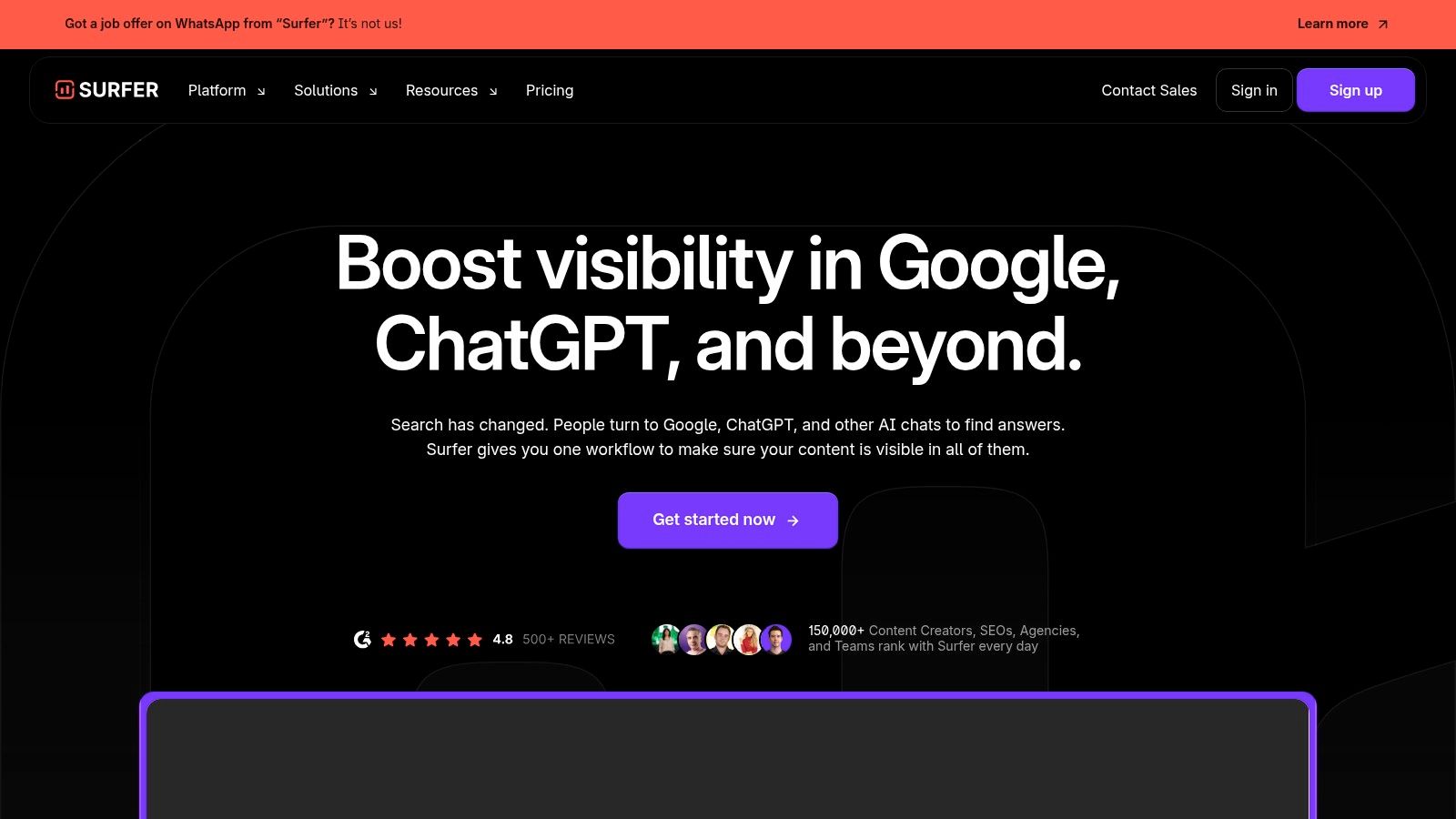
Unlike tools that focus solely on writing or auditing, Surfer integrates these functions tightly. Practical Example: A content manager can research the keyword "how to train a puppy," generate a detailed brief with SERP-derived outlines and headings, and then use the built-in AI Writer to produce a draft that already meets many of the optimization criteria. This unified workspace is its key differentiator, saving teams from juggling multiple subscriptions and platforms. For more context on how this approach fits into a modern strategy, you can learn more about AI-driven search optimization on LLMrefs.
Pricing & Key Features
Plans start at $89/month for the "Essential" plan, scaling up based on the volume of content editor queries and AI word credits. A 7-day money-back guarantee is available.
Pros: The unified platform is highly efficient, and its credit-based system is clear and scalable.
Cons: Higher-tier features like SERP Analyzer are locked behind more expensive plans, and its heavy reliance on top-ranking content means human oversight is critical to avoid creating derivative articles.
3. Clearscope
Clearscope is an enterprise-grade content optimization platform prized for its highly intuitive interface and precise NLP-driven term recommendations. It focuses on helping writers and content teams cover a topic comprehensively, ensuring content meets user intent by analyzing top-ranking pages. Its core strength lies in its Content Reports, which provide a clear letter grade (from F to A++) and a list of relevant terms, making it one of the most straightforward ai content optimization tools for improving on-page SEO.
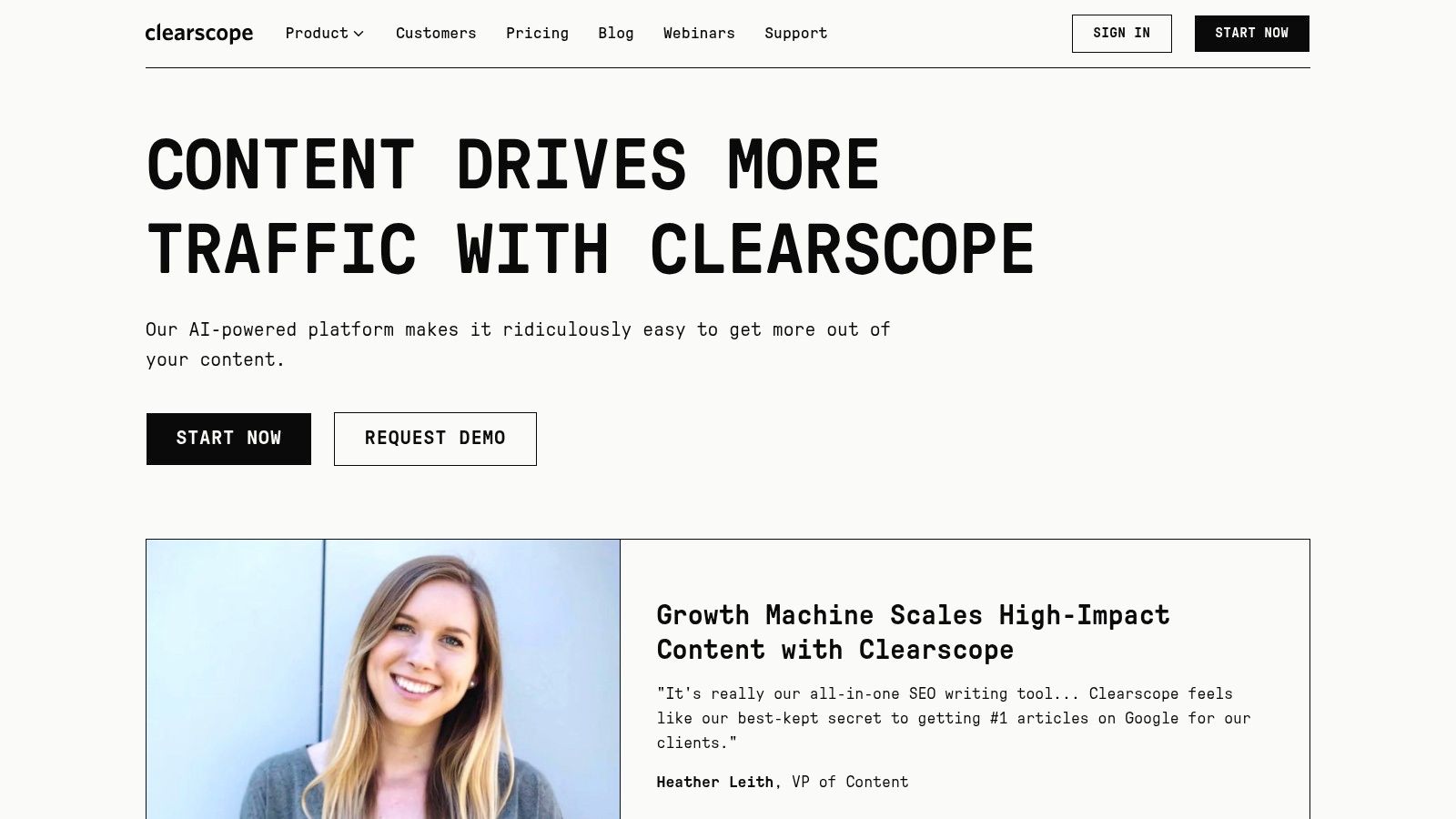
Unlike all-in-one platforms that include AI writers, Clearscope positions itself as a specialized optimization layer meant to augment a human-first or hybrid writing process. Practical Example: A writer can draft an article in Google Docs, then use the Clearscope add-on to get real-time feedback. As they write, the sidebar updates, showing which key terms they've used and which are still missing, guiding them toward an "A++" grade without ever leaving their document. This focus on integration and quality over quantity appeals to established content teams who already have their writing workflows but need a reliable, data-backed standard for excellence.
Pricing & Key Features
Plans start at $199/month for the "Essentials" plan, which includes 10 Content Reports and 20 Keyword Discovery credits. All plans support unlimited users.
Pros: The grading system is highly respected and easy for writers to understand. Unlimited users on all plans make it great for growing teams, and its Google Docs integration is seamless.
Cons: The entry price is significantly higher than many competitors, and it lacks a built-in AI writer, requiring teams to pair it with another tool for AI-assisted drafting.
4. MarketMuse
MarketMuse is a strategy-first platform that uses AI-driven topic modeling to help teams build topical authority and prioritize their content efforts. Rather than just focusing on single keywords, it provides a comprehensive view of your entire content inventory, identifying gaps and opportunities for new articles and updates. It’s one of the most powerful ai content optimization tools for large-scale content teams aiming to dominate a niche by becoming the go-to resource on a subject. Its standout feature is its ability to generate data-rich briefs that guide writers on covering a topic comprehensively.
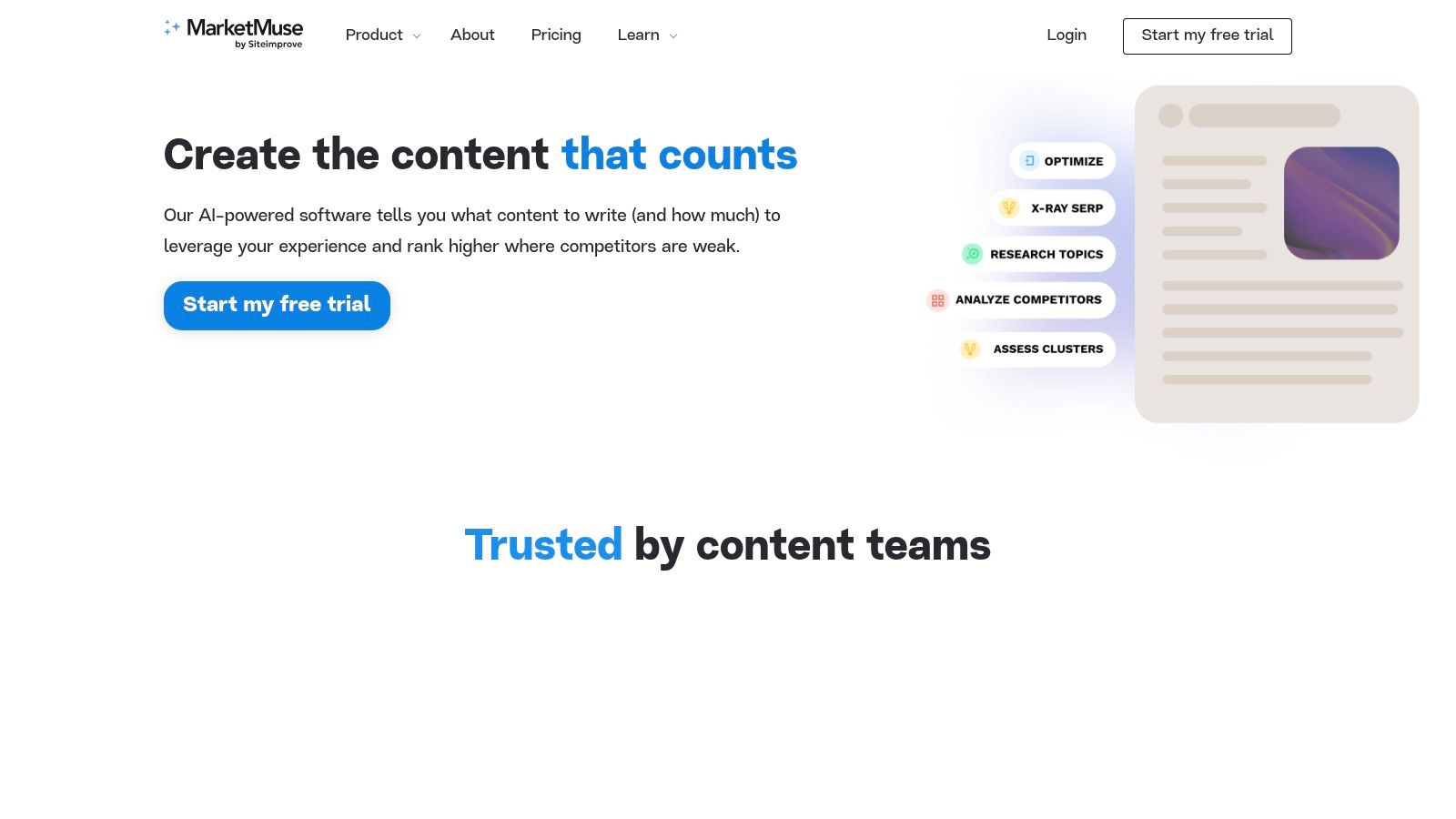
Unlike tools that prioritize keyword density, MarketMuse focuses on semantic relevance and content depth, helping you create a web of interconnected, authoritative content. Practical Example: Its Site Heatmap tool visualizes your existing coverage on the topic of "inbound marketing," immediately showing you have strong content on "lead generation" but are weak on "customer retention strategies." This provides an instant, actionable roadmap: optimize the existing article and create new "spoke" articles about retention to support your main "pillar" page. This high-level strategic guidance is what differentiates it. For those interested in mastering this approach, MarketMuse offers a comprehensive guide.
Pricing & Key Features
Pricing is customized based on team size and usage needs, requiring a consultation for a specific quote, though standard plans have been available.
Pros: Its inventory-level planning and topic-centric data are exceptional for building long-term authority. The platform is well-suited for complex editorial workflows and large content teams.
Cons: The platform has a steeper learning curve for non-SEO specialists, and pricing tiers are not always publicly disclosed, making it less accessible for smaller operations.
5. Frase
Frase is an AI-powered tool that accelerates the content creation workflow from research to final draft. It excels at quickly generating comprehensive, SERP-driven content briefs and using them to produce optimized first drafts. This makes it a powerful asset for freelancers and small teams needing to scale content production efficiently. Its core strength lies in its tightly integrated research and AI writing capabilities, allowing users to go from a target keyword to a well-structured article in minutes.
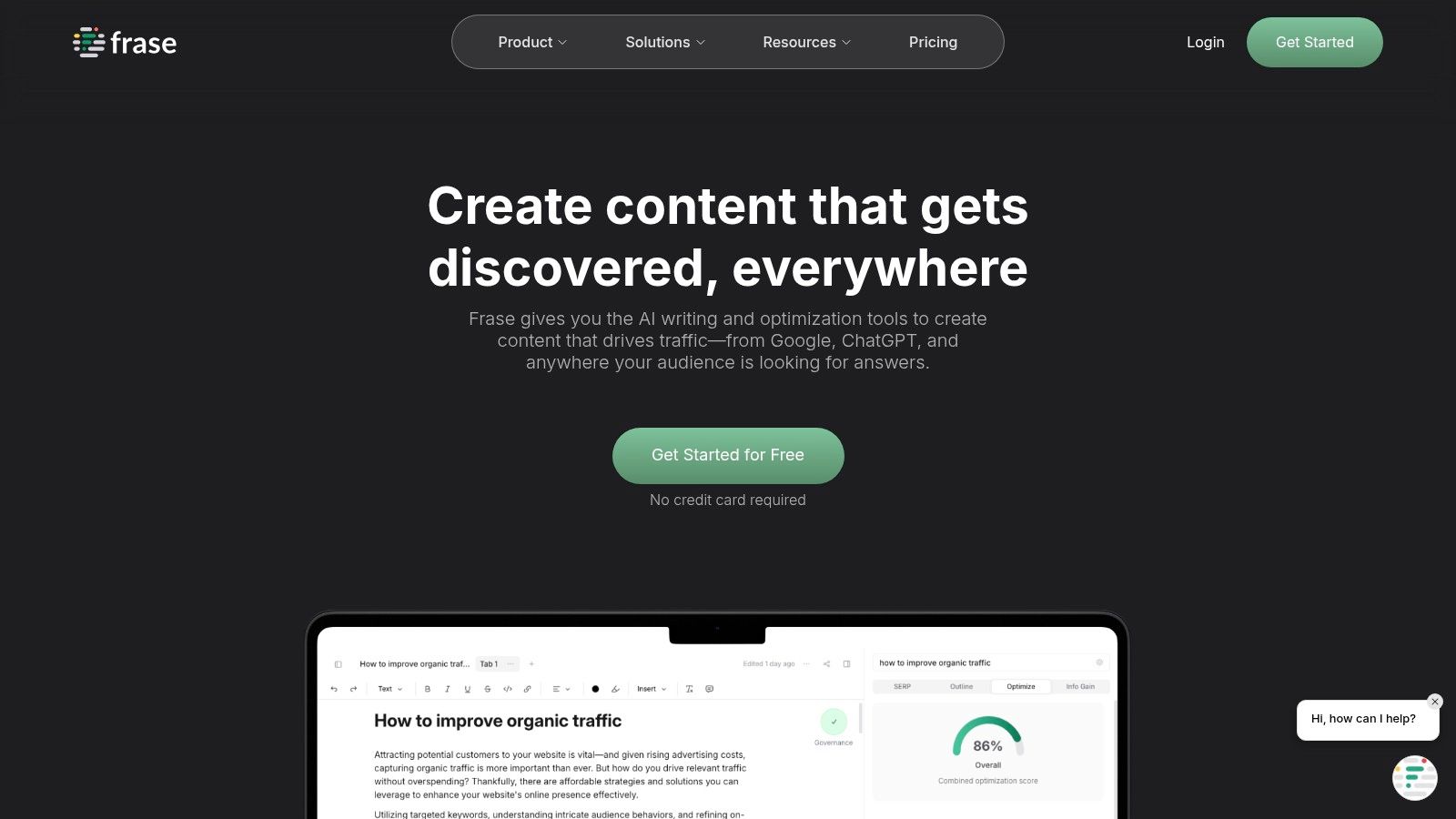
Unlike platforms that separate research from writing, Frase connects these stages seamlessly. Practical Example: A user inputs "benefits of remote work." Frase analyzes the top 20 search results, automatically extracts key headings, statistics, and common questions, and compiles them into a brief. The user can then click a button, and the AI writer uses this brief to generate a full draft, instantly incorporating competitor insights. This workflow makes it one of the most practical ai content optimization tools for users who prioritize speed and value.
Pricing & Key Features
Plans start at $14.99/month for the "Solo" plan, which is ideal for individuals. A "Pro" add-on for $35/month unlocks unlimited AI word generation and other advanced features. Frase also offers pay-as-you-go credits for its Rank-Ready AI articles.
Pros: The unlimited AI word generation on paid plans provides excellent value, and its plugin ecosystem enhances workflow integration.
Cons: Lower-tier plans have restrictive document and project quotas, and some key features require purchasing the "Pro" add-on.
6. Semrush (Content Toolkit + SEO Writing Assistant)
Semrush expands its legendary SEO data prowess into content creation with its Content Toolkit and SEO Writing Assistant. This suite is less a standalone tool and more an integrated layer on top of Semrush's existing ecosystem, making it one of the most powerful ai content optimization tools for users already embedded in the platform. It excels at creating SERP-informed content briefs, scoring content in real-time against top competitors, and maintaining a consistent brand voice.
Its primary advantage is the seamless workflow from keyword research to optimized publication. Practical Example: A user can identify "best CRM for small business" as a target keyword in the Keyword Magic Tool, generate a detailed content brief based on top SERP results, and then use the AI-powered SEO Writing Assistant directly within Google Docs. As they write, the assistant provides real-time suggestions on readability, tone of voice, and including semantically related terms, all without leaving their document. This tight integration removes friction and keeps optimization front-and-center. For a deeper look at how Semrush compares to other platforms, you can explore some of the best AI SEO tools on LLMrefs.
Pricing & Key Features
Features are available within Semrush's standard plans (starting at $129.95/month), with specific AI and content marketing functionalities requiring Guru or Business tiers. SEO-boosted articles and other advanced features may consume additional credits.
Pros: Deep integration with Semrush's extensive SEO data provides a huge strategic advantage, and the convenient workflows for Google Docs and WordPress users are highly efficient.
Cons: Key features are gated behind expensive subscription tiers, and the platform's overall interface complexity can present a steep learning curve for new users.
7. Scalenut
Scalenut is an AI-powered content intelligence platform that excels at automating the entire content lifecycle, from keyword planning to final optimization. It's particularly popular among SMBs and agencies for its "Cruise Mode," which generates a near-complete, SEO-optimized first draft from a single keyword in minutes. This end-to-end functionality, combined with its powerful keyword clustering feature, makes it one of the most efficient ai content optimization tools for scaling content production.
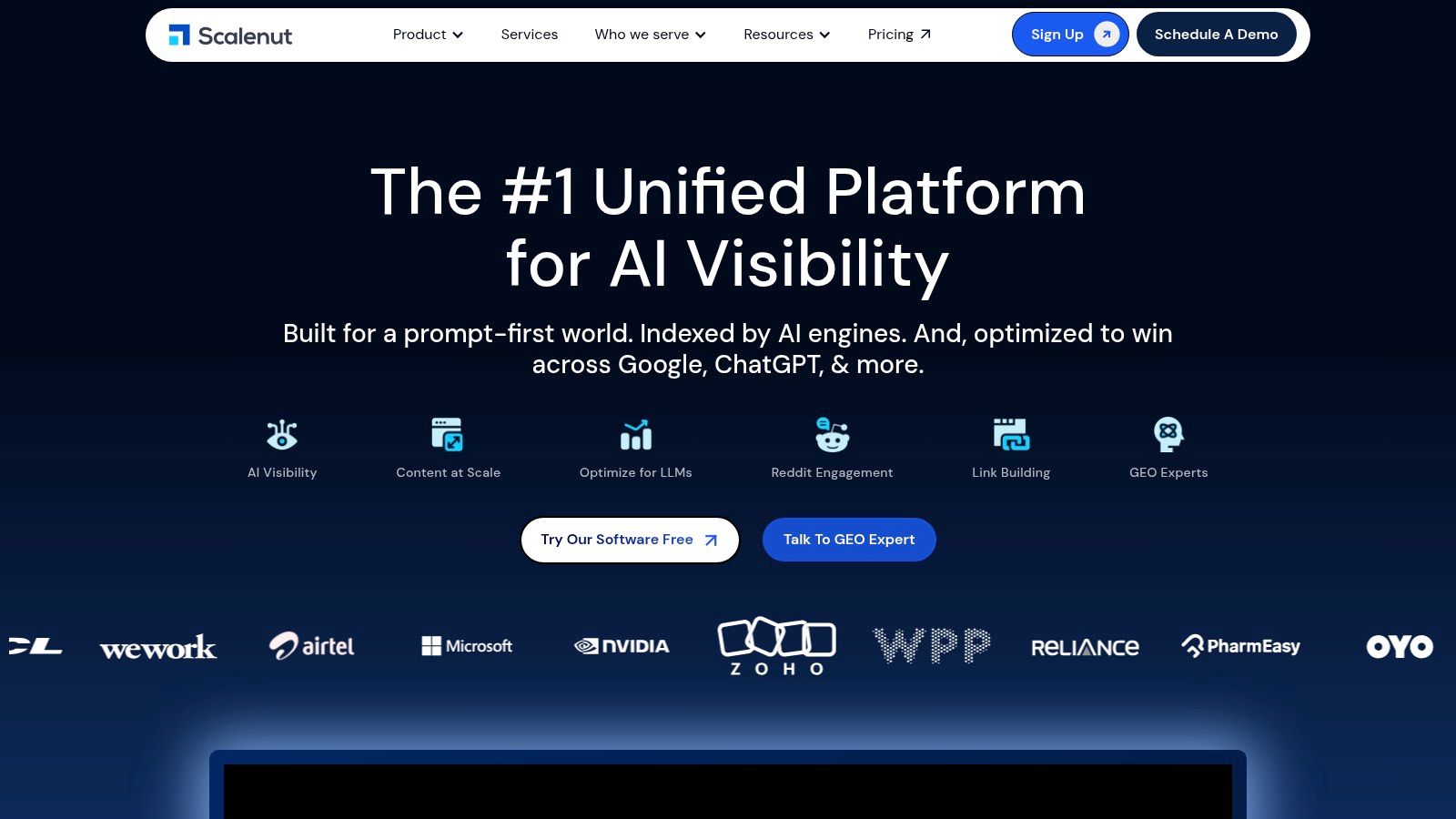
Unlike many competitors that focus either on writing or analysis, Scalenut integrates both. Actionable Insight: Use the topic cluster report to plan an entire content hub around "email marketing." Scalenut will suggest articles like "email marketing strategies," "best email marketing platforms," and "how to write a newsletter." You can then generate a brief for each, use Cruise Mode to create the first drafts, and optimize them in the editor, streamlining the creation of an entire authority cluster from one central dashboard.
Pricing & Key Features
Plans start at $39/month for the "Essential" plan, with significant discounts for annual billing. A free trial is also available, providing access to core features.
Pros: The comprehensive feature set offers excellent value for the price, and the keyword clustering is ideal for building topical authority and scaling content calendars.
Cons: Pricing promotions can be confusing, and advanced features like interlinking analysis are reserved for higher-tier plans.
8. NEURONwriter
NEURONwriter is an NLP-driven content editor known for its generous AI credits and a unique lifetime deal, positioning it as a highly accessible tool in the market. It focuses on providing detailed SERP analysis and a guided content creation process, from keyword research to final draft. Its one-click article designer, powered by GPT-4, can generate long-form articles complete with outlines and relevant terms, making it one of the most efficient ai content optimization tools for users who prioritize speed and affordability.
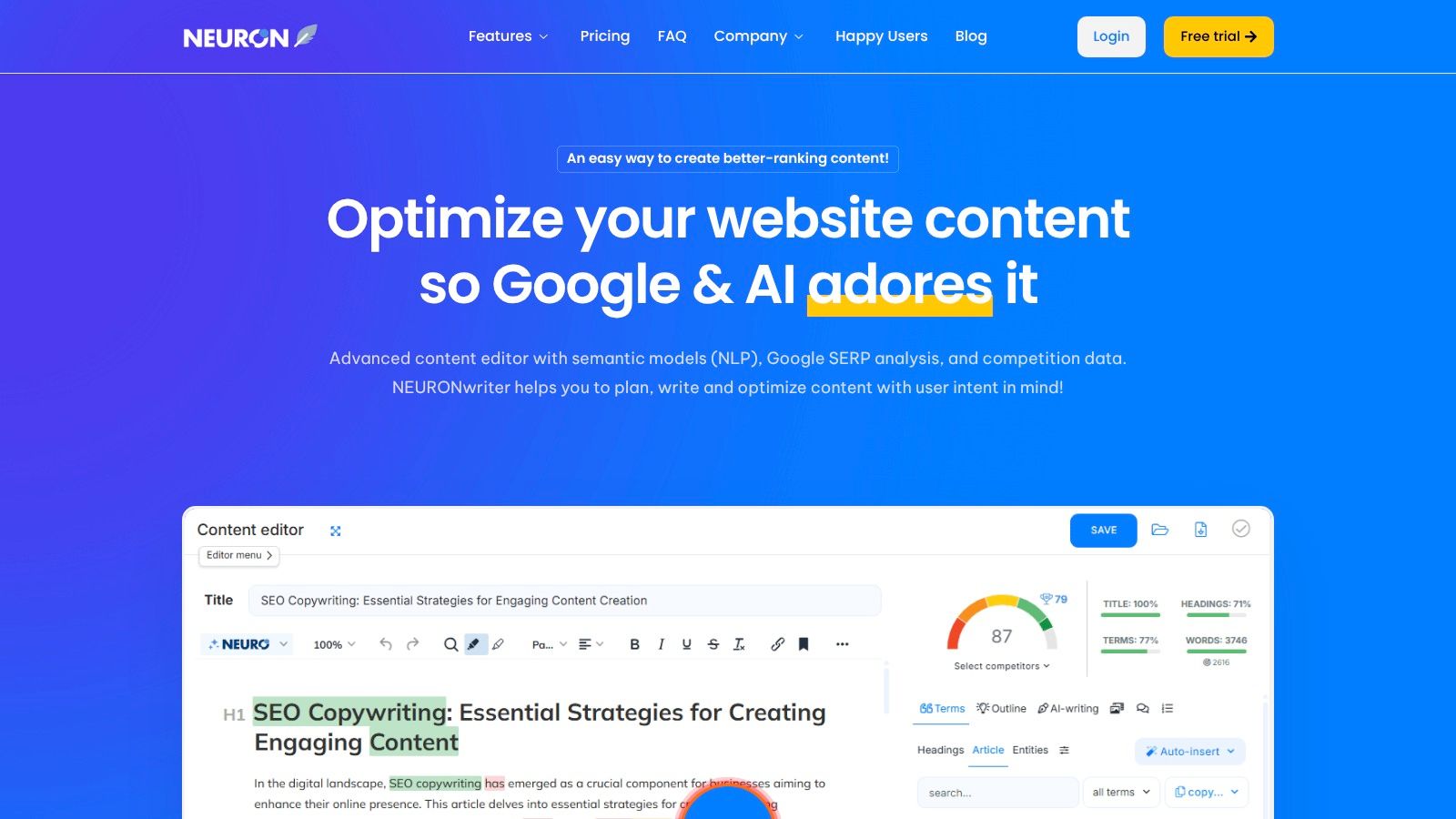
Unlike many competitors that rely solely on monthly subscriptions, NEURONwriter offers a lifetime license, appealing to freelancers and small agencies looking to control long-term costs. Its workflow is straightforward. Practical Example: Analyze the target keyword "cold brew vs iced coffee." Use the AI Content Designer wizard to generate a structured draft. Then, in the editor, the sidebar will show a list of recommended NLP terms like "brewing method," "acidity," and "caffeine content." As you naturally incorporate these terms, your content score increases in real-time, providing a clear path to a fully optimized article.
Pricing & Key Features
Monthly plans start from €19/month. The standout offering is its lifetime deal, which provides a one-time payment option for sustained access.
Pros: Competitive pricing with transparent plan limits, a unique lifetime deal for a one-time payment, and frequent updates including a convenient Chrome extension.
Cons: Some advanced capabilities like plagiarism checks are reserved for Gold+ plans, and the user interface may have a learning curve compared to US-centric tools.
9. Dashword
Dashword is a user-friendly platform that excels at simplifying the process of creating optimized content briefs and reports. It focuses on turning SERP analysis into clear, actionable instructions, making it one of the more accessible ai content optimization tools for teams who need a streamlined workflow without the complexity of an all-in-one suite. Its primary strength lies in its clean interface and efficient brief generation, allowing strategists to quickly build outlines that writers can follow.
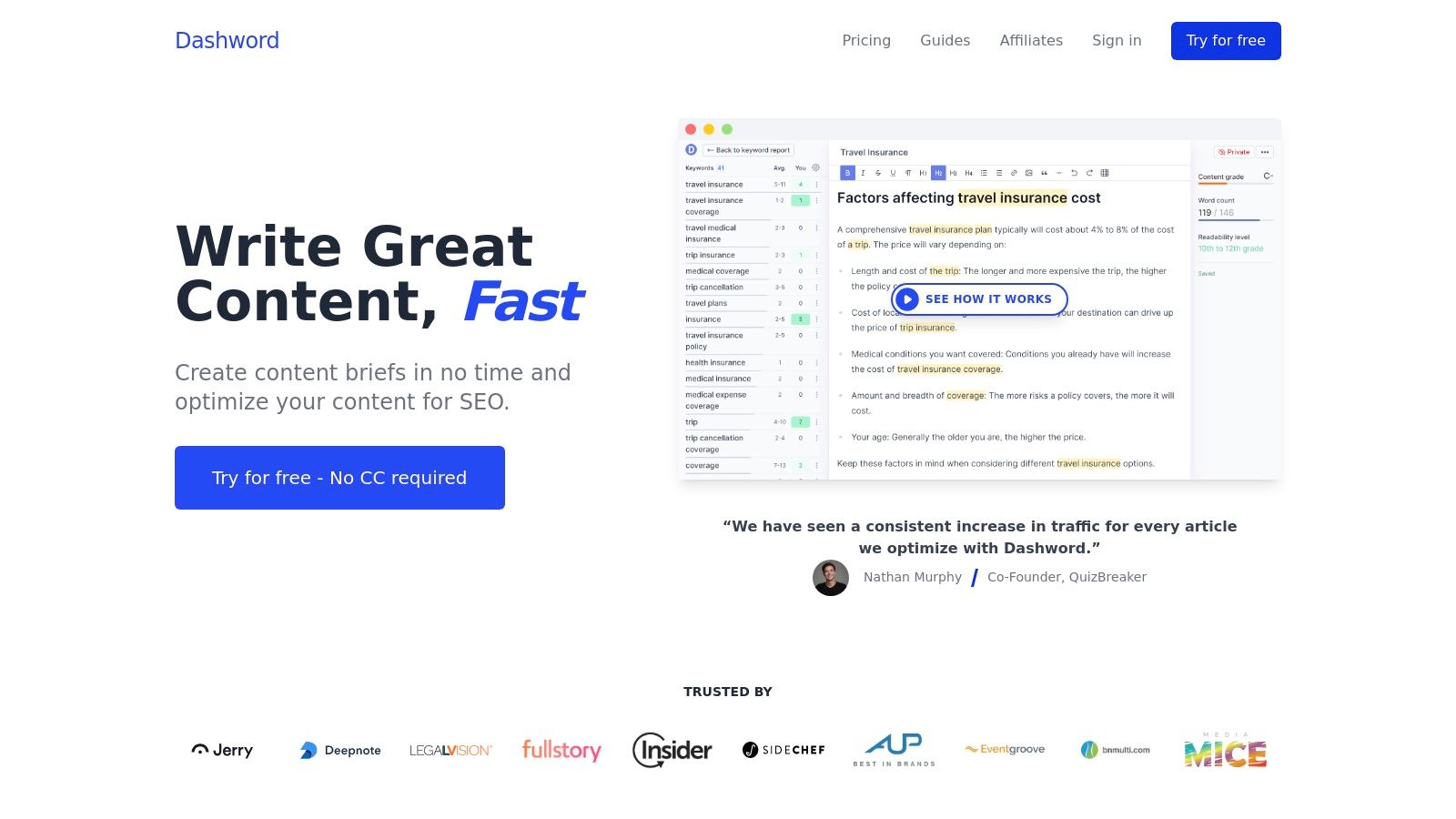
Unlike platforms that bundle a vast array of SEO functionalities, Dashword concentrates on doing one thing exceptionally well: content optimization. This focus makes it incredibly fast and intuitive. Practical Example: A content manager can generate a comprehensive brief for the keyword "how to choose a mattress" in minutes. This brief includes competitor outlines, a list of key terms with target usage counts, and common questions from the SERP. The writer then receives this clear, structured guide, enabling them to produce a highly relevant article without needing to be an SEO expert themselves.
Pricing & Key Features
Plans start at $99/month for the "Startup" plan, which includes 20 content briefs per month. The first report is free, offering a no-risk trial.
Pros: The clean, simple user interface is a major plus, and all plans include generous seat allocations for teams.
Cons: It lacks the broader SEO features of larger suites (like site auditing or backlink analysis), and Business tier pricing can increase with usage and seat count.
10. GrowthBar
GrowthBar is a lightweight and accessible AI writing and optimization toolkit designed for speed and simplicity. It focuses on core SEO tasks like keyword research, content brief generation, and on-page scoring, packaging them into a highly user-friendly interface. Its standout feature is its seamless workflow integration, primarily through a powerful Chrome extension that overlays SEO insights directly onto Google SERPs and works within WordPress.
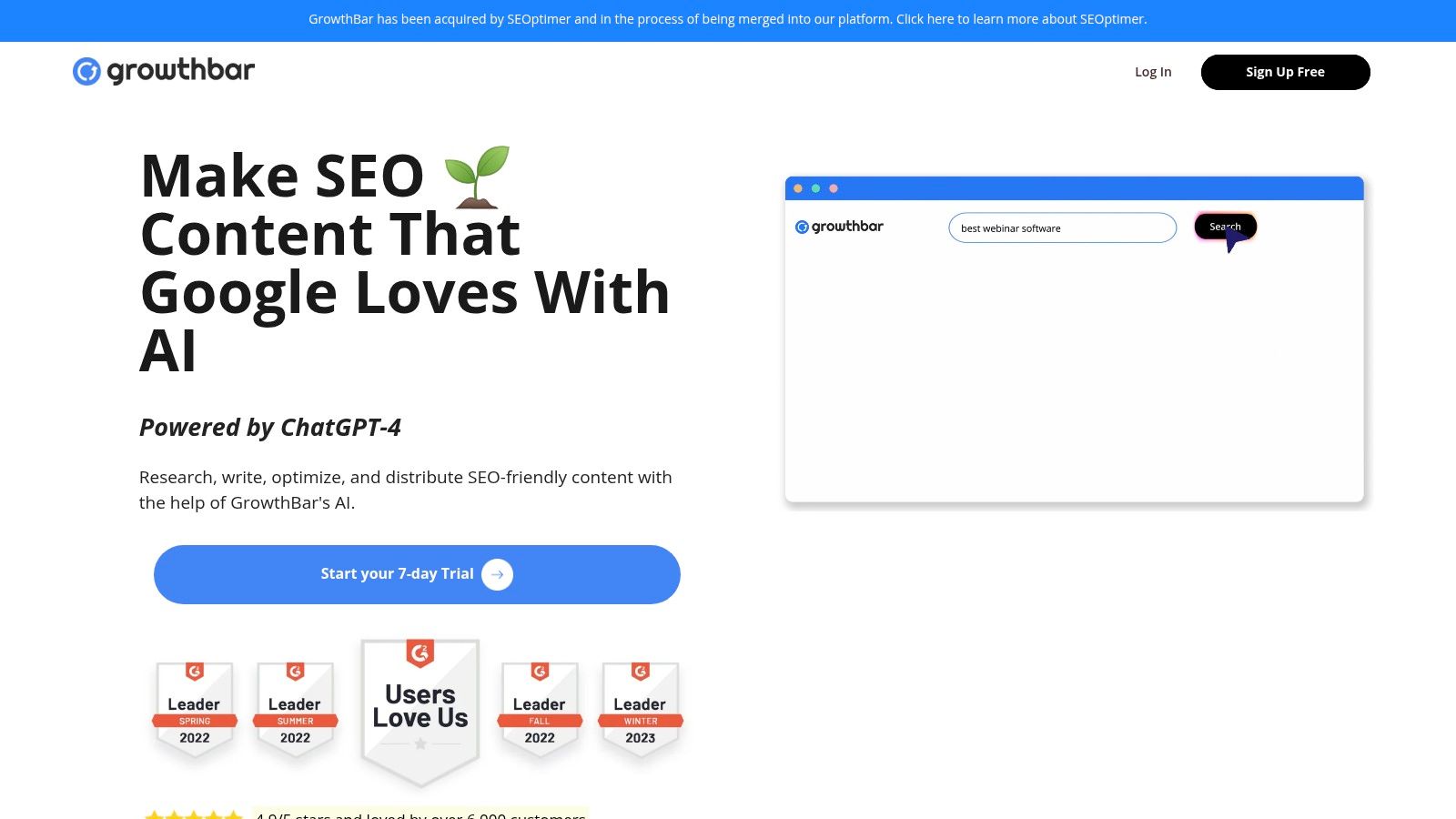
Unlike more complex, all-in-one platforms, GrowthBar excels at making ai content optimization tools less intimidating for freelancers, bloggers, and small businesses. Practical Example: While on the Google results page, you can activate the GrowthBar extension to see any site's domain authority, organic traffic, and top keywords. With one click, you can generate an AI content outline based on the top-ranking articles for that search term, copy it, and paste it directly into your WordPress editor to begin writing immediately. This streamlined process removes friction and steep learning curves. To see how GrowthBar fits into a broader toolkit, you can explore other AI-powered marketing tools on LLMrefs.
Pricing & Key Features
Plans start with a 7-day free trial. The "Standard" plan is $48/month, with higher tiers offering more AI word credits and keyword lookups.
Pros: The Chrome extension and WordPress integration create a very efficient workflow, and its easy learning curve is perfect for individuals and small teams.
Cons: It lacks the deep analytical features needed for large, multi-domain agencies, and its promotional pricing can sometimes make the long-term cost unclear.
11. PageOptimizer Pro (POP)
PageOptimizer Pro (POP) is a highly tactical on-page optimization suite designed by SEO veteran Kyle Roof, focusing on precise, data-driven tuning. It moves beyond general advice to provide specific recommendations based on Google’s patented algorithms and NLP analysis. The platform excels at generating detailed reports that show exactly which terms to use, where to place them, and how often, making it one of the most granular ai content optimization tools for specialists aiming for surgical precision.
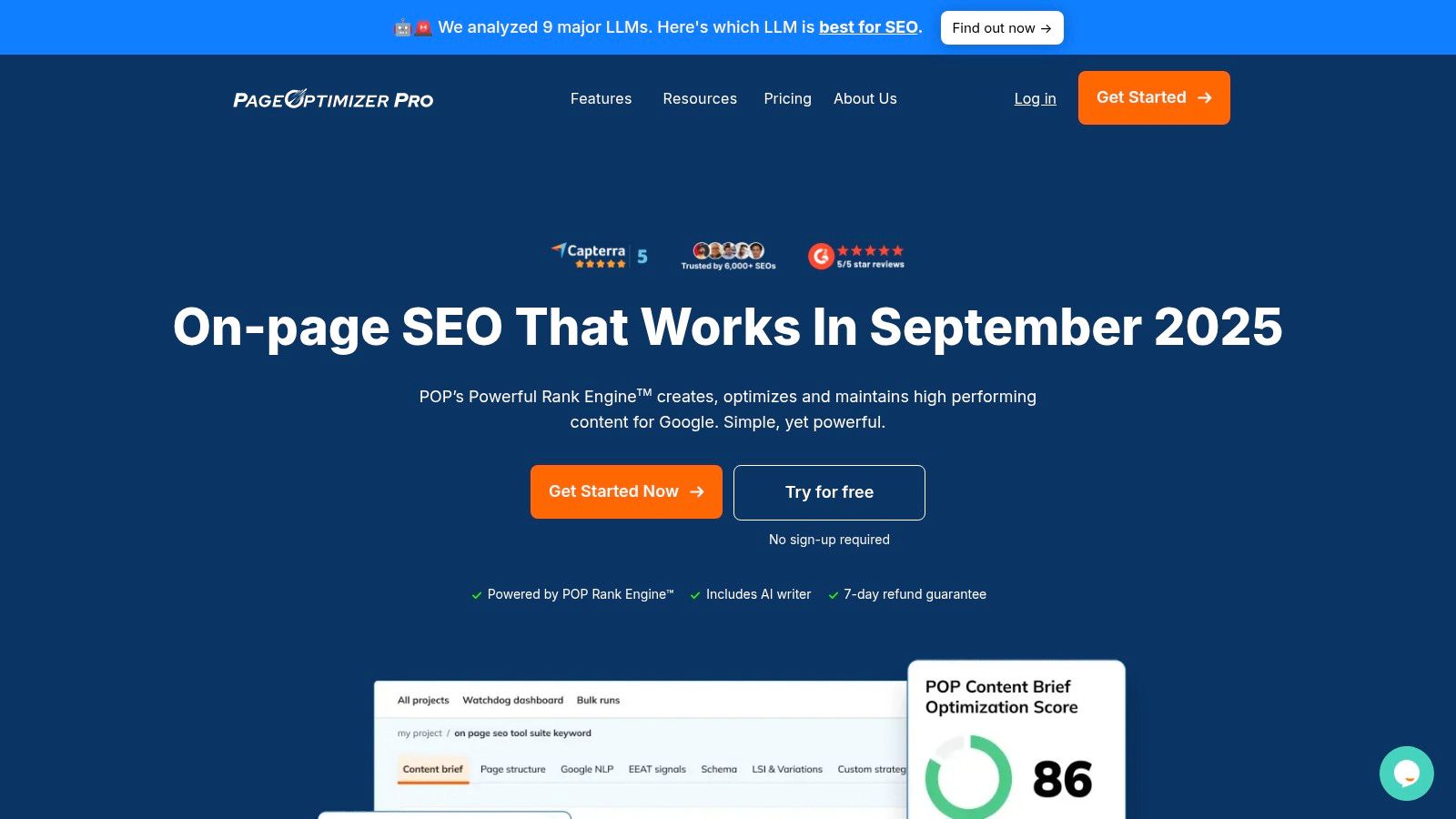
Unlike broader platforms that bundle content strategy and creation, POP's core strength lies in its scientific approach to on-page factors. It analyzes the SERP to identify the most important ranking signals and provides actionable steps, including E-E-A-T analysis and schema suggestions. Practical Example: You have a page ranking at position 12. Run a POP report, and it might tell you to add a specific E-E-A-T term in your H1 tag, increase the usage of a secondary keyword in the body copy by two instances, and add a specific LSI keyword to an image alt tag. Implementing these exact, granular changes can be the key to pushing it onto page one.
Pricing & Key Features
Plans begin at $39/month for the "Single User" plan, which is credit-based. Higher-tier agency plans offer unlimited report runs (subject to fair use) and more advanced features. A 7-day refund guarantee is available on all plans.
Pros: The credit system is flexible and cost-effective for solo users, while unlimited reports on higher plans benefit agencies. Its laser-focus on on-page variables provides clear, actionable guidance.
Cons: The user interface is more technical and less intuitive for content planning compared to all-in-one suites. Key features like NLP analysis require credits on lower-tier plans.
12. G2 – Content Optimization Software Category
While not a tool itself, G2's Content Optimization Software category is an indispensable research hub for anyone evaluating ai content optimization tools. It acts as a comprehensive software marketplace, aggregating vetted user reviews, feature comparisons, and satisfaction scores to help teams shortlist vendors. Instead of relying on marketing claims, users can filter platforms based on real-world feedback, company size, and specific feature requirements, making it an essential first step in the procurement process.
The platform excels at providing at-a-glance comparisons and surfacing authentic user sentiment. Practical Example: You can create a comparison grid between Surfer, Clearscope, and MarketMuse. This grid will show you real user ratings for key criteria like "Ease of Use," "Quality of Support," and "NLP Features." You can also read recent review snippets that highlight practical pros and cons, such as "Surfer's AI writer is fast but needs heavy editing," giving you a crowdsourced perspective that is difficult to find elsewhere.
Pricing & Key Features
Access to G2's comparison data and reviews is free for users. Pricing information for individual software vendors is often listed but may be approximate.
Pros: Saves significant research time by consolidating user reviews and feature data. It covers a wide range of tools, from enterprise-level suites to SMB-focused solutions.
Cons: Some vendor descriptions are submitted by the vendors themselves, and pricing details can sometimes be outdated or missing for certain listings.
Top 12 AI Content Optimization Tools Comparison
Tool | Core Features / Unique Selling Points ✨ | User Experience / Quality ★★★★☆ | Value Proposition 💰 | Target Audience 👥 | Price Points 💰 |
|---|---|---|---|---|---|
LLMrefs 🏆 | Real-time AI search monitoring; Proprietary LLMrefs Score; Competitor gap analysis | Intuitive SaaS platform; Team collaboration; Priority support | Free starter + Pro $79/mo; scalable plans | SEO pros, agencies, enterprises | Free & $79/mo (50 keywords) |
Surfer | AI article generation; Content editor with NLP terms; On-page audit | Balanced tools for research, writing & optimization | Credit-based usage; 7-day refund | Teams needing SERP-driven briefs | Paid plans + add-ons |
Clearscope | NLP-driven content grading; Keyword discovery; Unlimited users/projects | Strong scoring system; Easy onboarding | Simple plans; Add-ons available | US content teams, enterprises | Higher entry price |
MarketMuse | Topic modeling; Content briefs; SERP X-Ray & heatmaps | Deep topical insights; Editorial planning | Pricing not fully transparent | Teams focused on topical authority | Variable, often custom pricing |
Frase | AI article wizard; Content briefs; Plugins for docs & WP | Flexible pricing; Robust plugin ecosystem | Subscription or credit purchase | Freelancers, small teams | Subscription + per-document credits |
Semrush (Content Toolkit) | AI content creation; SEO Writing Assistant; Integrations | Deep SEO data integration; Publishing workflows | Add-on pricing for extra credits | Existing Semrush users | Subscription + add-ons |
Scalenut | Keyword clustering; AI drafts; Humanizer & AI detection | Competitive pricing; Fast content scaling | Aggressive annual discounts | SMBs scaling content calendars | Tiered with promotions |
NEURONwriter | NLP content editor; Lifetime license available | Frequent updates; Chrome extension | Competitive & lifetime deal | Teams wanting flexible payments | Subscription or lifetime |
Dashword | Content briefs; AI writer; Bulk reporting; Google Docs add-on | Simple UI; Team seat allocation | Business tier scales with usage & seats | Teams needing straightforward tool | Tiered pricing |
GrowthBar | AI blog drafts; Keyword research; Chrome & WP integration | Easy for freelancers & SMBs | 7-day trial with refund | Freelancers, SMBs | Subscription |
PageOptimizer Pro (POP) | On-page SEO reports; AI writer; E-E-A-T & NLP tools | Tactical focus; Flexible credit bundles | Pay-as-you-go credits available | SEOs needing detailed on-page tools | Credit bundles |
G2 – Content Optimization | Reviews; Rankings; Feature comps; Pricing insights | User-generated feedback; Detailed filters | Free marketplace & research tool | All SEO buyers | Free |
Choosing the Right AI Tool for Your Content Workflow
We've explored a comprehensive landscape of AI content optimization tools, from all-in-one SEO powerhouses like Surfer and Semrush to specialized platforms like LLMrefs. The key takeaway is clear: the era of "gut-feeling" content strategy is over. Data-driven, AI-assisted optimization is no longer a competitive edge; it's the baseline for visibility and success. Each tool we've covered offers a unique approach to dissecting search intent, identifying content gaps, and refining your copy for maximum impact.
Your choice should not be about finding the single "best" tool, but the right tool for your specific context. A freelance writer might find the affordability and focused feature set of NEURONwriter or Dashword perfectly suited to their needs. A large enterprise content team, on the other hand, may require the collaborative workflows and deep topical authority analysis offered by MarketMuse or Clearscope.
Making Your Decision: A Practical Framework
To move from analysis to action, consider these critical factors when evaluating which of these ai content optimization tools to integrate into your workflow:
Primary Goal: Are you focused on traditional search engine rankings (Surfer, Clearscope), or are you future-proofing your content for Generative Engine Optimization (GEO) and visibility in AI-powered answers (LLMrefs)? Define your number one priority first.
Team Size & Workflow: How many users need access? Do you need seamless integration with Google Docs or WordPress for your writers? Platforms like Frase and Surfer excel here, offering browser extensions and simple sharing features that reduce friction for content teams.
Budget & Scalability: Assess the pricing models. Are you comfortable with credit-based systems (like Frase or Scalenut) or do you prefer a fixed-tier plan? Consider not just your current budget, but how the cost will scale as your content production increases.
Technical Expertise: Evaluate the learning curve. A tool like PageOptimizer Pro (POP) offers incredibly detailed, scientific SEO recommendations but may be overwhelming for beginners. In contrast, GrowthBar provides a more streamlined, user-friendly experience ideal for startups and marketers who wear multiple hats.
Your Next Steps
The most effective way to finalize your choice is through hands-on experience. Don't rely solely on feature lists. Shortlist your top two or three contenders based on the framework above and commit to using their free trials or lowest-cost plans. Assign a real-world content brief to each platform. Actionable Step: Task each tool with optimizing a new blog post on "project management tips" or refreshing an underperforming article about "content marketing ROI." This direct comparison will quickly reveal which interface feels most intuitive and which dataset provides the most actionable insights for your niche.
Ultimately, these ai content optimization tools are not replacements for strategic thinking, creativity, or deep audience understanding. They are powerful force multipliers. They handle the heavy lifting of data analysis, allowing you to focus on what matters most: crafting exceptional content that resonates with your audience and achieves your business goals. By thoughtfully selecting and implementing the right platform, you equip your team to create content that doesn't just rank, but truly performs.
Ready to optimize your content for the next wave of search? While traditional SEO remains crucial, visibility in AI answer engines is the new frontier. LLMrefs is the first-of-its-kind platform designed specifically to track and improve your brand's presence in generative AI responses. See how your content performs in AI-powered search and start optimizing for tomorrow by visiting LLMrefs today.
Related Posts
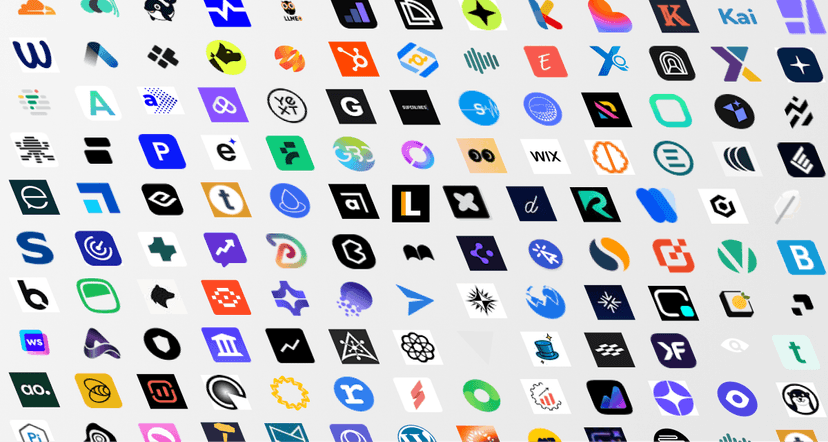
December 14, 2025
The Ultimate List of AI SEO Tools (AEO, GEO, LLMO + AI Search Visibility & Tracking)
The most complete AI SEO tools directory. 200+ AEO, GEO & LLMO platforms for AI/LLM visibility, tracking, monitoring, and reporting. Updated Jan 2026.

December 13, 2025
How ChatGPT memory works, reverse engineered
Reverse engineering ChatGPT Memories reveals it does not use RAG or vector databases. It uses: metadata, facts, conversation summaries, and a sliding window.

December 10, 2025
33 key terms you need to know for AI SEO in 2026
Comprehensive glossary of 33 essential terms for AI SEO in 2026. From GEO and AEO to citations and fan-out queries, learn the vocabulary that defines modern search optimization.

December 8, 2025
AI assistants are not search engines
We analyzed 4.5M ChatGPT conversations. Two thirds have zero commercial intent. People use AI to think, not to shop. Here is what that means for your content strategy.